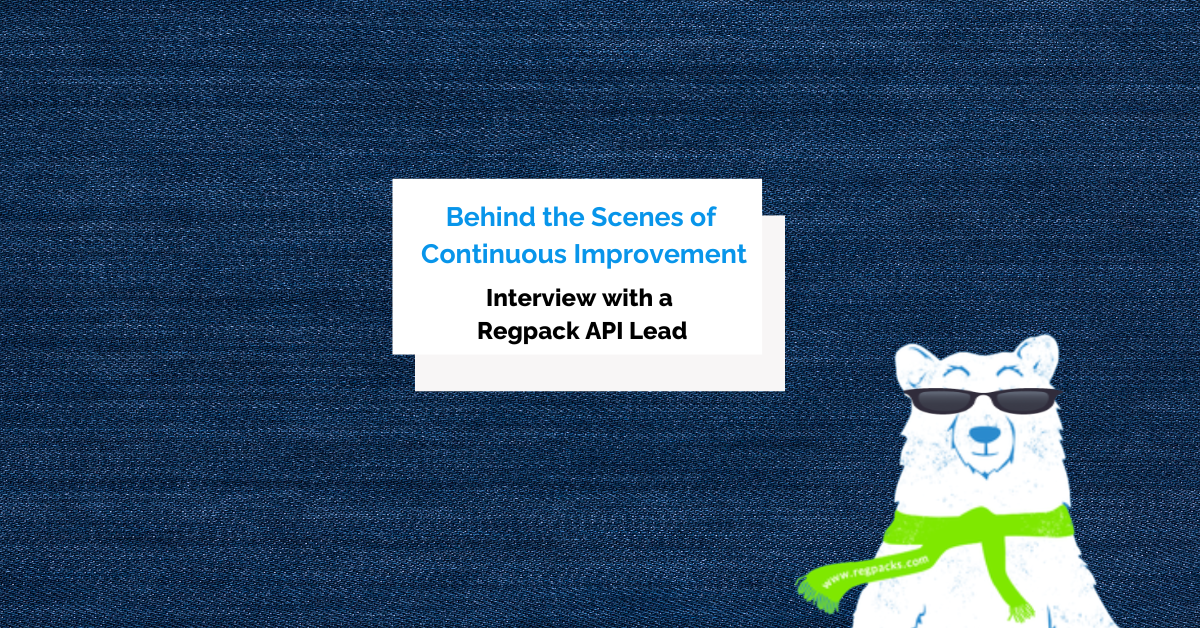A good reputation is the most valuable asset to any private K-12 school, college, and university. But it’s also the most sensitive one.
A solid reputation can take years to establish, bringing with it increased student enrollment and retention, improved fundraising, a steady cash flow, and profits.
On the other hand, it can be easily damaged or even destroyed, particularly in today’s online world.
Therefore, it’s crucial for private school professionals tasked with managing their institution’s reputation to find ways to consistently maintain and improve their school’s image.
Against this backdrop, here are five methods that can help you boost your private school’s reputation.
- Promote Diversity at Your School
- Be Active on Social Media
- Involve Student Ambassadors and Alumni
- Focus on Student Retention
- Use Software to Streamline Processes
- Conclusion
Promote Diversity at Your School
Although your school may be already promoting diversity, equity, and inclusion (DEI) in some way, this broad topic is so important for your students and your school’s reputation that you should always strive to improve your DEI efforts.
Our society is becoming increasingly diverse, not only in terms of race, ethnicity, and religion, but also sexual orientation, gender identity, and socioeconomic status.
So, when educational institutions, from preschools to universities, promote diversity, they show their students that acceptance, respect, and tolerance of different cultures, perspectives, and backgrounds is the social norm they should follow later in life.
At the same time, these schools strive to create a learning environment where students from diverse backgrounds feel welcome, supported, and valued, which in turn improves their academic performance.
Therefore, promoting DEI is essential for the student’s success in both school and future employment, and it’s also crucial for creating a less biased and more tolerant society at large.
In fact, according to Drexel University, your school’s DEI efforts can help students reap the following benefits:
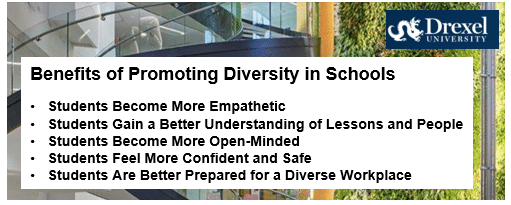
Source: Drexel University
Of course, for this to happen, your school’s commitment should be supported by intentional actions involving the faculty, staff, students, parents, and the local community.
With an intentional approach, you’re promoting diversity while also improving your school’s public image.
For instance, this can mean actively gathering feedback from these groups to identify areas where your school can improve its DEI efforts and/or encouraging staff members and students from diverse backgrounds to take leadership roles in promoting diversity.
Naturally, there’s a whole range of other measures your school can take to foster diversity, such as:
- offering financial support for students from underrepresented groups
- actively recruiting faculty and staff from diverse backgrounds
- adjusting the curriculum to promote inclusive and culturally responsive behaviors
- seeking new resources, partnerships, and creative ways to promote diversity
- continuously monitoring, assessing, and updating DEI policies and practices
Of course, as we’ve already mentioned, these actions will also enhance your school’s reputation among students, parents, staff, and community members.
Overall, remember that promoting diversity and inclusion at your school is essential for your students’ future success and for society at large, as well as a great opportunity to continuously improve your school’s reputation.
Be Active on Social Media
Today, many aspects of your school’s reputation are predicated on the quality of its online presence, which starts with the school’s website and social media channels.
The rise of the internet and social media has changed how schools approach their reputation management, which now includes the information posted or shared on their website, social media platforms, and other online spaces.
Therefore, private schools should be active on platforms like Facebook, Instagram, TikTok, Twitter, LinkedIn, etc., where they can share their stories and post engaging content as a way to build and maintain a good reputation.

Source: Freepik
Of course, your school’s choice of social media channels will depend on your target audience.
For instance, Facebook is great for reaching parents, but may not do much for your school’s reputation in the eyes of the younger generations.
A good platform for showcasing your school to potential students through photos and videos is Instagram, where students and parents can get an impression of the school’s character and community.
Here’s an example of an elementary school in New Jersey:

Source: Instagram
Of course, if your school hasn’t used or been active on its social media accounts, it might be best to start with just one platform and build your social media presence from there.
In the context of reputation management, social media posts should highlight the successes of your students and alumni, as well as your school’s achievements in other areas, such as volunteering events and local community engagement.
Remember that all content generated on social media can also be linked to or retrofitted on your school’s website, which remains the first point of contact for many prospective students and their families.
Overall, being active on social media should be an integral part of your school’s efforts to build and maintain its reputation in this increasingly digital world.
Involve Student Ambassadors and Alumni
Of course, both current and former students play an essential role in improving your school’s reputation through their active involvement in different promotional activities.
One way to achieve that is to appoint school ambassadors, i.e., students chosen to represent the school to prospective students.
This is a great way to promote your school and enhance its reputation, as potential students view student ambassadors as trusted sources of real-world information about the school.
Your school can tap into this resource by establishing a student ambassador program for which students can apply, like in this example.
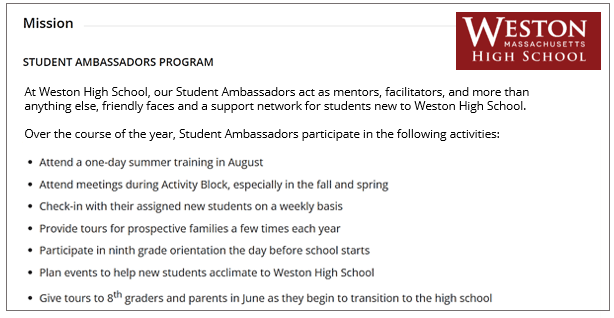
Source: Weston Schools
Under this program, student ambassadors are selected among the sophomores, juniors, and seniors who apply for the role and can commit to participating in the above-listed activities.
Of course, all your students have a key role in enhancing your school’s reputation through their academic performance and general conduct, as well as through their word-of-mouth recommendations and comments on social media and web forums.
When it comes to your alumni, using their success stories in your marketing materials and sharing them on your website and social media is a logical step in managing your school’s reputation.
Furthermore, you should strive to keep your graduates actively involved in different alumni activities from the moment they leave school.
For example, to keep them informed and engaged after they graduate, your school can design an alumni-dedicated website and/or a social media account, such as the one Princeton has on Twitter.
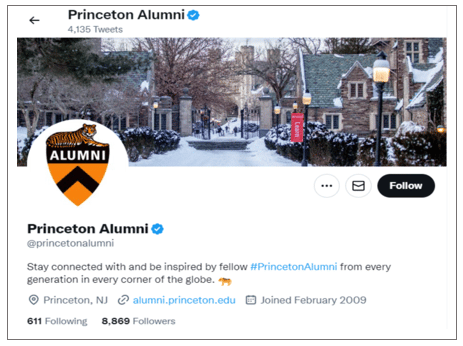
Source: Twitter
Of course, your alumni should be encouraged to participate in various activities like alumni networking events, reunions, mentorship programs, and fundraisers.
On top of that, your top graduates can be asked to speak at different events and/or represent the school as ambassadors.
Overall, involving your former students and using their success stories is a win-win situation that boosts both their and your school’s reputation or, as Chris Lang at Digistorm puts it:
Your alumni are out there doing amazing things. Keeping track of and calling out their achievements will help position your school as a destination for successful people and will also give them a little exposure in return.
Given all of the above, it’s clear that involving student ambassadors and alumni in different promotional activities and keeping their engagement high plays a crucial role in improving your school’s reputation.
Focus on Student Retention
Of course, it takes more than being attractive to prospective students for a private school to have a good reputation, and focusing on student retention is an essential element in doing so.
Put simply, a high student retention rate is a sign of your school’s commitment to its students and the quality of their education and, as such, reflects positively on your school’s reputation.
Furthermore, proactively working on reducing the number of students who drop out for any reason can bring other reputation-boosting benefits, such as the students’ improved academic outcomes and a stronger school community.
So, what can your school do to improve student retention and, by extension, enhance its reputation?
Here are five strategies from our article on this topic.
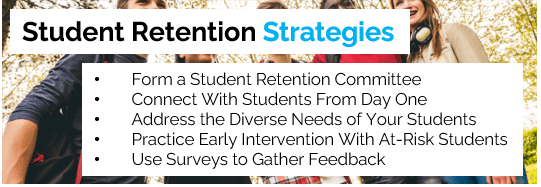
Source: Regpack
For example, a student retention committee should, as a cross-departmental body composed of staff and faculty members, discuss retention-related problems and propose solutions that can help students stay enrolled at your school from one year to the next.
Of course, collecting feedback from students is equally important for identifying enrollment issues and designing effective student retention strategies.
However, connecting with students from the start, meeting their diverse needs, and timely intervening with at-risk students are some of the best practices used by schools focused on improving their student retention rate.
To sum up, focusing on student retention can help you decrease the number of students who drop out, i.e., achieve a higher student retention rate, which positively reflects on your school’s image.
In other words, implementing student retention strategies will contribute to your school being perceived as a high-quality educational institution with dedicated teachers and engaged students, which is the perfect reputation booster.
Use Software to Streamline Processes
Similar to promoting diversity or having a website, it’s highly likely private schools are already using one or more software solutions to enhance the learning process and streamline other operations.
However, there’s always room for reflection, review, and further optimization, particularly in light of the rapid technological progress we’re experiencing.
Since there are just too many software tools that schools can use to streamline their processes, we’ll focus on a few main types, their uses, and their benefits for the school’s reputation.
The first group of software tools is called a learning management system (LMS).
Schools use learning management systems to enhance the educational experience for their students, facilitate their collaboration in the classroom, and assess their progress.
One such LMS whose core version is free for educational institutions is Moodle.
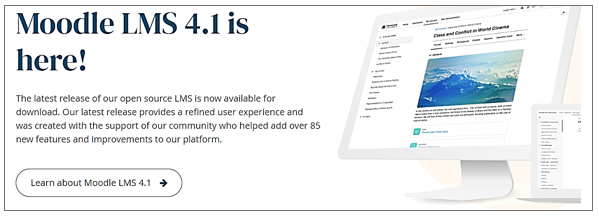
Source: Moodle
Moodle includes a wide range of features, tools, and plugins that schools can use to create and manage online course content, including materials like assignments, quizzes, and tests, as well as to track student performance, provide feedback, and grade their work.
At the same time, Moodle can be used to communicate with parents in many ways, such as giving them access to course materials, assignments, and student progress, or enabling parents and teachers to create discussion groups on different topics.
The end result is a streamlined teaching and learning process and improved communication and transparency between everyone involved, all of which help boost your school’s reputation over time.
Other main types of software used by schools to streamline their processes are focused on managing student information, the admissions process, financial aid programs, as well as tuition payments.
One example of software that can help schools manage admissions and receive secure online payments of tuition is Regpack.

Source: Regpack
Regpack is an online registration and billing software that allows schools to establish a secure payment portal for students or parents.
Once they log in, they can check their payment plan, and after that, it only takes a couple of clicks to effortlessly pay their tuition installment.
At the same time, the software allows for easy online payment of donations made by, for instance, your alumni or other school supporters.
Overall, this and other software solutions allow schools to digitize and automate various educational and administrative processes, making them more efficient and less error-prone, contributing to their image of competent organizations.
Of course, your school should evaluate its own software needs, carefully review available options, and select appropriate solutions for streamlining its processes and, by extension, improving its reputation.
Conclusion
As said in the opener, a good reputation is the most valuable and sensitive asset of any private school that needs to be consistently maintained, and improved whenever possible.
This can be done by promoting diversity, being active on social media, involving student ambassadors and alumni, focusing on student retention, and using software to streamline your school’s processes.
That way, your school will be able to enhance the student’s academic performance, increase student enrollment and retention, and improve its finances.




